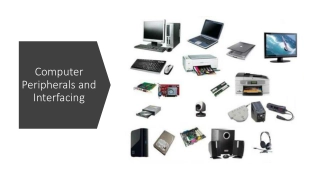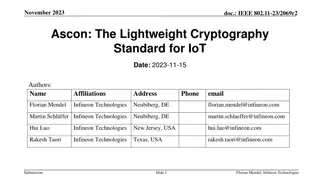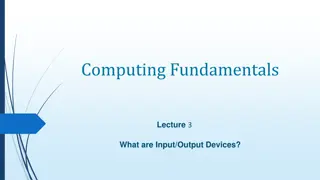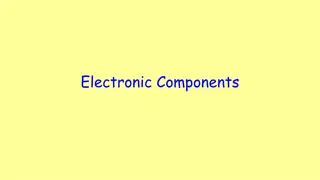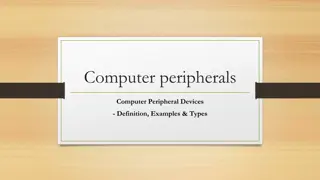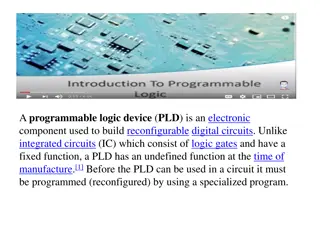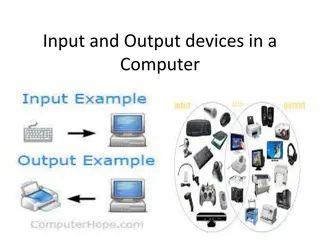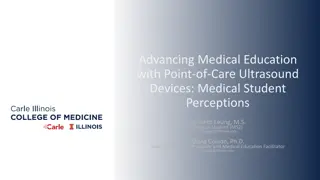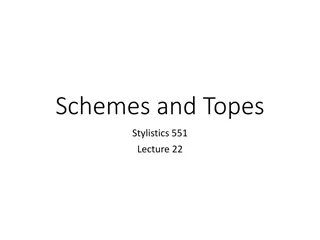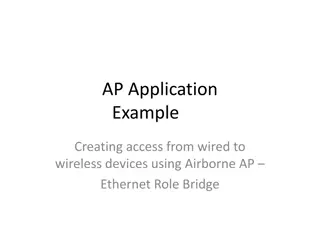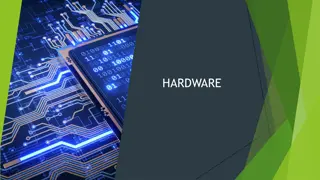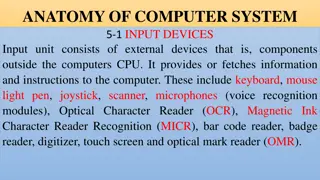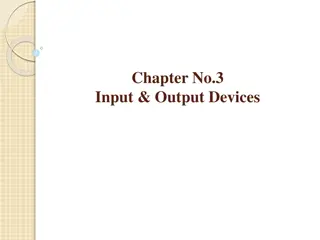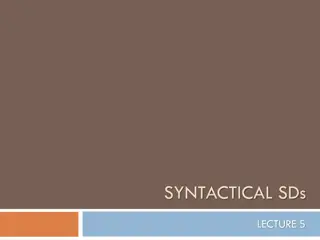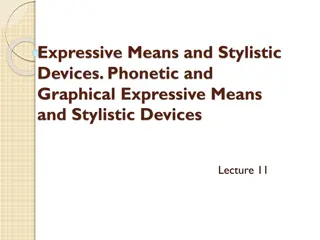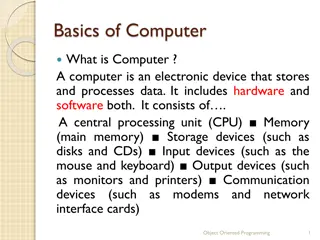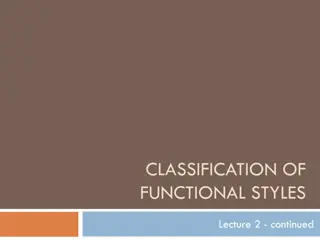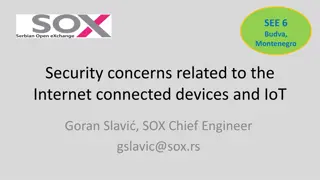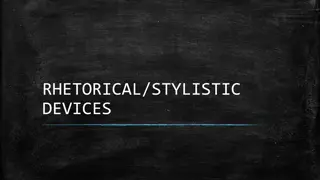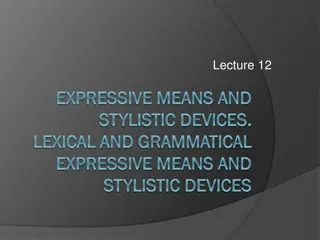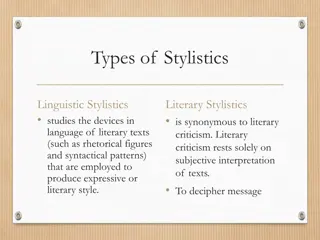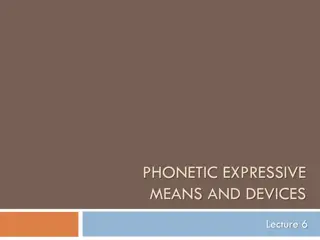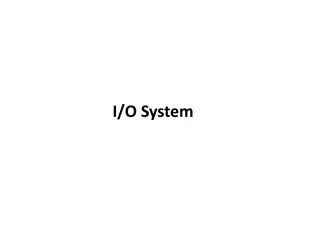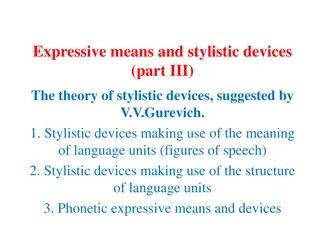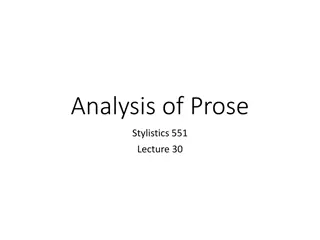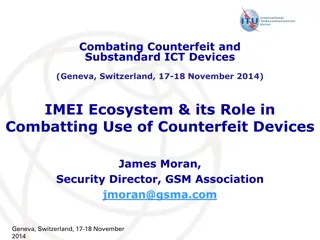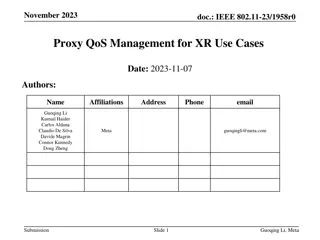Computer Peripherals and Interfacing
Computer peripherals are external devices that enhance the functionality of a computer. They include input devices like keyboards and mice, output devices like printers and monitors, and storage devices like hard disk drives and solid-state drives. Interfacing circuits connect these peripherals to t
1 views • 6 slides
Ascon: The Lightweight Cryptography Standard for IoT
The November 2023 document IEEE 802.11-23/2069r2 discusses the importance of secure data storage and communication in IoT devices due to the increasing number of connected devices and potential security threats. It introduces Ascon as a lightweight cryptography standard selected by NIST for protecti
0 views • 26 slides
Lightweight Cryptography Standard for IoT - November 2023 IEEE Presentation
IEEE 802.11-23/2069r1 presents Ascon as a lightweight cryptography standard for IoT devices. With the increasing number of connected devices, protecting data on IoT devices becomes crucial. NIST selects Ascon to safeguard small devices, offering authenticated encryption and hashing efficiently. Asco
3 views • 26 slides
Overview of Stilistik in Bachelor's Studies
Stilistik in a Bachelor's program covers theoretical basics, stylistic concepts, micro and macro stylistics, and key texts in the field. It explores stylistic analysis, linguistic disciplines, communication styles, and the impact of style on various forms of expression including everyday communicati
6 views • 63 slides
An Exploration of Stylistics in Linguistics: Expressive Means and Stylistic Devices 2. Stylistics as a branch of linguistics examines expressive means and stylistic devices which enhance the emotive and aesthetic qualities of language. These include
Stylistics, Linguistics, Expressive Means, Stylistic Devices, Language
5 views • 25 slides
Understanding Network Devices and Connectivity
Network devices play a crucial role in connecting computers and printers to networks, facilitating fast and secure data transfer. These devices, such as network interface cards and WiFi cards, help devices communicate effectively on the same or different networks. MAC addresses uniquely identify dev
6 views • 31 slides
Understanding Input and Output Devices in Computing
In computing, input and output devices play a crucial role in enabling communication between users and computers. Input devices are used to enter data into a computer, while output devices display or provide the results of processed information. Common input devices include keyboards, mice, and joys
0 views • 17 slides
Understanding Basic Input/Output Operations in Computer Organization
Basic Input/Output Operations are essential functions in computer systems that involve transferring data between processors and external devices like keyboards and displays. This task requires synchronization mechanisms due to differences in processing speeds. The process involves reading characters
0 views • 11 slides
Understanding Electronic Components and Input/Output Devices
Explore the world of electronic components, input devices, and output devices through energy changes and symbol representations. Learn about LEDs, resistors, and energy conversions in a hands-on manner. Discover the role of various devices like microphones, solar cells, loudspeakers, and diodes in c
1 views • 24 slides
Understanding Computer Peripheral Devices: Definition, Examples, and Types
Learn about computer peripheral devices, which enhance a computer system's functionality. Examples include mice, keyboards, monitors, printers, and scanners. These devices can be categorized into input, output, and storage devices, each serving a specific purpose to expand the capabilities of your c
2 views • 13 slides
Based on the content provided, here is the information: "Stylistic Analysis & Morphology in Visual Presentation
Explore the connection between stylistic analysis and morphology in a visual context. Dive into the intricacies of form and style through a series of slides illustrating key concepts and examples.
0 views • 20 slides
Understanding Programmable Logic Devices (PLD) in Digital Electronics
Programmable Logic Devices (PLDs) are versatile electronic components used to create reconfigurable digital circuits, distinct from fixed-function integrated circuits. PLDs require programming before use, enabling customization for specific functions. This article explores PLDs, digital electronic s
0 views • 10 slides
Automotive Grade 10 Joining Methods: Locking Devices Overview
Automotive Grade 10 explores joining methods using locking devices to prevent nuts from loosening due to movement and vibration. Friction-locking devices include lock nuts, stiff nuts, and special washers. Positive-locking devices tighten nuts securely with slotted nuts, crowned nuts, tab washers, a
1 views • 7 slides
Understanding Input and Output Devices in a Computer
Input devices play a crucial role in sending data to a computer, allowing users to communicate instructions for processing, display, storage, and transmission. Key input devices include keyboards and mice, each serving specific functions and enhancing data collection and accuracy. Discover the advan
0 views • 17 slides
Perceptions of Medical Students on Point-of-Care Ultrasound Devices
This study evaluates medical students' perceptions of SonoSite Edge II and Butterfly iQ ultrasound devices for enhancing learning experiences in ultrasound and medicine. The research involved first-year medical students using both devices and providing feedback through pre- and post-session surveys.
3 views • 10 slides
Unveiling the Intricacies of Schemes and Tropes in Stylistics
Schemes and Tropes in classical rhetoric play a vital role in enhancing written and spoken language by deviating from literal expressions. These stylistic devices, known as figures of speech, add depth, beauty, and emotional intensity to communication. Schemes involve repetitions of expression, whil
0 views • 19 slides
Guide to Creating Access from Wired to Wireless Devices Using Airborne AP Ethernet Bridge
Explore a comprehensive guide on setting up access from wired to wireless devices using Airborne AP Ethernet Role Bridge. Learn how to connect a PLC and a wireless laptop to the same network, configure settings for both devices, and successfully ping between the devices. Follow step-by-step instruct
2 views • 7 slides
Understanding Computer Hardware: Key Input Devices and Pointing Devices
Explore essential computer hardware components such as keyboards, mice, and pointing devices. Learn about the different types of keyboards including ergonomic and laser keyboards, as well as various mouse types like wireless, cabled, and optical mice. Discover how pointing devices like touch screens
0 views • 18 slides
Exploring Stylistic Elements of Folklore: Rule of Three, Magic Helper, and Talisman
Folklore, encompassing fairy tales and folktales, often feature stylistic elements like the Rule of Three, Magic Helper, and Talisman. The Rule of Three, a common writing strategy, creates a pattern that enhances storytelling and reader engagement. Magic Helpers, characters with extraordinary powers
2 views • 16 slides
Overview of Computer Input and Output Devices
Input devices of a computer system consist of external components like keyboard, mouse, light pen, joystick, scanner, microphone, and more, that provide information and instructions to the computer. On the other hand, output devices transfer information from the computer's CPU to the user through de
0 views • 11 slides
Understanding Input and Output Devices in Computers
Input devices like keyboards, mice, joysticks, light pens, scanners, and more play a crucial role in interacting with computers. This chapter explores the functions and features of various input devices used in computing, such as keyboards for data input, mice for cursor control, and joysticks for C
0 views • 12 slides
Understanding Syntactical Stylistic Devices in Literature
Syntactical Stylistic Devices (SSDs) are structural elements of language that contribute to the stylistic effect of a piece of writing, independent of its lexical content. These devices, such as inversion and detachment, play a crucial role in shaping the depth and effectiveness of literary works. C
2 views • 39 slides
Understanding Expressive Means and Stylistic Devices in Language
Expressive means and stylistic devices play a vital role in intensifying language utterances, encompassing phonetic, morphological, lexical, word-building, phraseological, and syntactical forms. These tools help evoke emotions, logical emphasis, and additional meaning in communication. By utilizing
0 views • 13 slides
Understanding Basics of Computer Systems
A computer is an electronic device that stores and processes data using hardware and software components. It consists of a CPU, memory, storage devices, input/output devices, and communication devices. The CPU includes a Control Unit and Arithmetic Logic Unit, and the memory stores data in bytes. St
0 views • 57 slides
Understanding the Publicistic Style in Writing
The publicistic style encompasses various forms of written and oral communication, such as newspaper articles, essays, and oratorical speeches. It aims to convince and persuade the audience through a combination of logical argumentation and emotional appeal. This style utilizes a wide range of vocab
0 views • 29 slides
Exploring Stylistic Analysis and Morphology in Visual Presentation
Delve into the world of stylistic analysis and morphology through a series of visually engaging slides. Analyze the nuances of language structure and stylistic elements, enhancing your understanding of how they shape communication. The images provide a visual journey into the intricate details of li
0 views • 19 slides
Guide to Stylistic Analysis: Research and Writing Phases
Explore the essential phases of stylistic analysis - research and writing-up. Begin with thorough preparation and analysis in the research phase, followed by careful selection of key elements. Then, transition to the writing-up phase by crafting a detailed account of your insights and structuring yo
0 views • 16 slides
Security Concerns and Future Challenges of Internet Connected Devices in Budva, Montenegro
With the increasing number of Internet-connected devices and IoT, the security concerns are escalating. In the past, communication was restricted to servers and terminals, but now everyone is connected globally. The future poses even greater risks with IoT becoming prevalent. Reasons for concern inc
0 views • 17 slides
Exploring Rhetorical and Stylistic Devices in Speeches
Delve into the world of rhetorical and stylistic devices used in speeches, such as repetition, imagery, and devices of comparison like simile, metaphor, analogy, and juxtaposition. Understand how these devices enhance the impact and effectiveness of communication, with examples ranging from politica
0 views • 10 slides
Understanding Lexical and Grammatical Expressive Means in Stylistic Devices
The lecture discusses various lexical and grammatical expressive means in stylistic devices, such as metaphor, personification, allusion, metonymy, synecdoche, irony, epithet, and oxymoron. These tools allow for creative and vivid expressions in language by playing with different meanings and associ
0 views • 22 slides
Understanding Linguistic and Literary Stylistics
Linguistic Stylistics explores devices in language of literary texts to create expressive styles. Literary criticism relies on subjective interpretation, while Stylistic Analysis in linguistics identifies patterns in speech and writing. This content delves into the phonological, graphological, and l
0 views • 17 slides
Understanding Phonetic Expressive Means and Devices in Language
Phonetic expressive means and devices are utilized to enhance the acoustic effect of speech, emphasizing the utterance and evoking emotions in the audience. These tools come into play both in oral and written forms of communication, directly through intonation and stress in spoken language and indir
0 views • 36 slides
Wireless Office Docking Model for Multiple Devices
This document outlines a usage model for office docking involving wireless connections between mobile devices and various peripheral devices such as monitors, hard drives, printers, and more. It describes scenarios for single and multiple devices in both home and office settings, emphasizing the nee
0 views • 5 slides
Understanding I/O Systems and Devices
I/O systems and devices play a crucial role in computer operations. They can be categorized into block devices and character devices based on their functionalities. Block devices store information in fixed-size blocks with addresses, while character devices handle character streams. Some devices, li
0 views • 19 slides
Gait Device Selection for Children with Lumbar Level Myelomeningocele
This presentation discusses the considerations and choices of gait devices for children with lumbar level myelomeningocele. It covers the specific needs of pediatric patients, benefits and drawbacks of various devices, funding requirements, and clinical application through case studies. The material
0 views • 31 slides
Exploring Stylistic Devices: Metaphor, Metonymy, Repetition, and More
Delve into the theory of stylistic devices proposed by V.V. Gurevich, covering figures of speech, structural devices, and phonetic expressive means. Discover examples of metaphors, metonymy, repetition techniques like anaphora and climax, along with their impact on language usage and expression.
0 views • 22 slides
Exploring Poetry: Forms, Devices, and Impact
Delve into the world of poetry and prose with an in-depth look at what sets them apart, how authors manipulate stylistic devices to evoke emotions, the significance of performance in poetry, and the role of poetry in advocating for social justice. Discover the beauty and power of poetic expression t
0 views • 13 slides
Understanding Stylistic Analysis in Literature
Stylistic analysis in literature involves examining linguistic features like lexis, grammar, foregrounded elements, and context to distinguish between literary and non-literary prose. While poetry allows for whole text analysis due to its brevity, prose analysis often focuses on selected extracts fo
0 views • 16 slides
Combatting Counterfeit and Substandard ICT Devices: IMEI Ecosystem & Its Role
The conference held in Geneva, Switzerland in November 2014 addressed the critical issue of combatting counterfeit and substandard ICT devices, focusing on the IMEI ecosystem and its significance in preventing the use of counterfeit devices. James Moran, Security Director at GSM Association, highlig
0 views • 12 slides
Proxy QoS Management for XR Devices in IEEE 802.11-23/1958r0 - November 2023
This document discusses the challenges faced by XR devices in terms of size, thermal constraints, cost, and power limitations leading to the proposal of Proxy QoS Management to enhance Wi-Fi performance. The aim is to leverage TGbn devices for improving legacy devices' connectivity within a Wi-Fi ne
0 views • 6 slides
